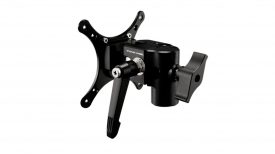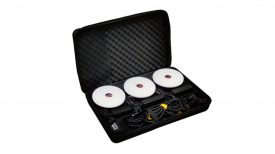Guest post by Christian Parkinson of imagejunkies.com:
RTS award-winning shooter Darren “DC” Conway has been a colleague of mine for a number of years. He is a genuine legend in the news business and is widely regarded as one of the best cameramen/editors in the world. He is part of the independent TV production company Infocusasia, has been filming for the BBC for many years and is currently based in Asia.

DC – A few things worked in tandem. I was always interested in the world of images, starting early by playing around with stills and then processing them myself. I also played Australian rules football at quite a high level and during an injury break – literally, as I had broken my ankle quite badly – I spent a lot of time moping in front of the TV at home. I must have been around 16 at the time. My mother decided it was time to kick me in the ass and so tried to engage me in a conversation about what I would do if the football gig didn’t work out.
Well, I was pretty into whatever garbage it was that I was watching on TV at the time and in an attempt to get rid of my mother I apparently pointed at the TV and pronounced that I would become a cameraman. Before I knew it my father had contacted a friend who was an executive at a local network, and kind of knew me from football as well, so I was offered a job as an assistant cameraman / sound recordist.
The thought was that I would do it until I healed properly and took up football again. Which is in fact what I tried to do, but never quite got the speed back that was required for the position I played. At the same time I was really enjoying this new world of television, so a very difficult decision had to be made. It was a very tough call at the time and I tried to juggle the two for a while, but both suffered so I eventually, and at the time very sadly, dropped the football. This was obviously the right call to make. I’ve made many wrong ones, but not on this occasion thankfully.
CP – What training did you get?
DC – The cameramen in Australia at the time were brilliant. Very old school, as in incredibly strict at the learning process. If they thought early on that you didn’t have the “eye” you were simply let go. So you started out as an assistant cameraman/ sound recordist. This means that you would carry a stupidly heavy machine around that was slung on your shoulder, it was connected to the cameraman with a multi-cable or umbilical cord. The pictures and sound were recorded into this device onto tape. So basically you were a mule with headphones that had to react fast otherwise the cameraman would be looking down on you in disgust! Down on you because you seemed to spend a lot of time crawling around on the ground. I think a mix of having to keep out of shot and an excuse to get that lump of equipment off your shoulder. Other chores included… cleaning the kit, packing the kit, cleaning the car and pretty much being a slave to the requests of everyone in the news room. But… the guys took a real interest in your growth. It wasn’t all about lugging and sound but more about watching, learning, asking questions and discussing all forms of camera operation and the visual world.
So once you had the sound worked out you would move onto lighting, setting up the lights pre shoot under the watchful eye and guidance of the cameraman. The cameraman would then come in and usually talk you through your mistakes. Then you would sit in edit suites with the editors night after night watching them weave together the footage that was filmed during the day. Seeing what worked and what didn’t, watching them pull their hair out when something didn’t cut or when there was not enough to work with or when it just looked bad.
Hands on was what it was all about – hands on everything, that is, except for the camera. That was the golden chalice and something that we could not touch until they thought we were absolutely ready. The cameraman really cared about the skills that they were handing over, they invested the time and were very proud when they could see that you were finally getting it. In my eyes these guys were the best, and still are! I doubt I would be here today without them!
CP – What advice would you give to anybody who wants to follow in your footsteps?
DC – It’s a different world now. Getting that sort of hands-on experience while on the job is pretty much a thing of the past. But that doesn’t mean it’s impossible. Seek out people that you admire and get in touch. Everyone has their own style of imagery to find, but getting there is what’s most important and learning first hand is still a very valuable gift. I’m pretty sure that all of the experienced cameramen today would love to pass on their thoughts and skills to those who seemed genuinely interested in learning. Other than that, treat every shoot as if it’s your own personal feature film. Everything deserves to be filmed as brilliantly as possible whether it’s for a two minute news piece or a feature length documentary. Pay homage to the story; that is what’s most important. After all, we are just giving a voice to those who need their story told.
So film from the heart and never film anything that you would personally not want to see on TV yourself.
CP – You were just filming in Syria. What kit did you use and why?
DC – I am mostly using the 5D kit now – for Syria, that is. Look, there is a lot of back and forth on this, so there is plenty to read online about the comparisons between different camera formats.
For me it’s all about being able to keep the visual standards as high as possible while taking into consideration the complexities of the filming locations. We all know how dangerous Syria is at present to operate in. Add to that the physical demands required, from the long hikes to the ability to be able to move fast and secretively while ensuring that you don’t stand out as much as possible. So there are many factors that come into play, but you don’t want any of them to interfere with the image quality that you are trying to achieve. This was our main problem as recently as a year or so back, but I find that the 5D and similar cameras are now enabling us to maintain image quality while helping to overcome all the points I just mentioned.

CP – What were the strengths/limitations of this kit?
DC – The prime lenses are light and fast offering wonderful depth of field and variety of lens sizes. The ability to get in close and personal is brilliant, offering a much more personal perspective. The low light capability is getting better, allowing for natural light to be used as it should be, without interfering but just enhancing a little now and then if necessary.
The cameras are light and portable, as are all the accessories. So you can have a back pack and a pouch with everything you need, including enough batteries and cards to last a few days without downloading or charging if required. Of course nothing is perfect: How many lenses can you really take? And how fast can you change them? We all know the advantages of having a gorgeous zoom lens, especially when the world around you is moving fast. So changing lenses is a little painful and time consuming.
Audio audio audio… Need I say more?

CP – What other kit do you normally use and why?
DC – A mixture really…We have already talked about the 5D kit, but the camera we have been using lately is the PMW-500. I am still far from getting the 500 to look acceptable, in my eyes at least, but forever hopeful that Sony might get their act together with some very necessary upgrades. I’m a fan of the Sony PDW-F800 XDCAM and am primarily using that on docs that I am filming.
But… like everyone else, there are so many cameras that I would love to get my hands on. Seems to be a new one coming out every other week now. No use listing them – there are just too many.
CP – What accessories do you never travel without?
DC – Accessories huh? Well, we are after all boys that like toys, right? And with the career choice that we made we are lucky enough to be surrounded by great toys. Accessories are for me the mechanism that enables us to realise our visual inspiration. The trick is to not over-accessorise I think.
So I have loads of stuff that I regularly swap around depending on the shoot’s individual requirements. One accessory that I try to never travel without… Vegemite, of course. There is, after all, no better way to start the day, right?
CP – Everybody who has ever worked with you always rates you as one of the best in the world. What would you say are your biggest strengths?
DC – Well, that is very kind, but there are a bunch of brilliant cameramen doing amazing work out there.
As anyone who knows me will testify, I am not the most technical operator out there so I depend on colleagues and close friends to keep me up to speed.
Knowing your kit, though, is so invaluable, and by knowing it I mean being able to operate your camera in the dark. Knowing where everything is without having to think about it is something that will save the day. So not having to think about the camera but having it come naturally to you I think is very important. That way your mind is concentrating on what is most important, the story around you.
Feel the story: don’t just look, but actually see and feel and care. People are letting us into their lives and some on what is usually their worst day. Sometimes they are heartbroken or just broken; they are vulnerable, they are confused and they are lost. Sometimes they are inspired or they are inspirational. No matter what, though, they generally trust us to tell their story, so use that trust and that emotion for them! Not for the pat on the back from your boss or the accolades from your peers, but use it for them. It is such a privilege to be able to tell their story – don’t let them down!
CP – What’s next for you?
DC – It’s all about Syria, right now, where all the BBC teams are doing an amazing job in incredibly tough circumstances.

This guest post was originally published by Christian on his blog www.imagejunkies.com and is reproduced with kind permission.






